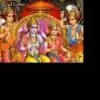Newindiapress on Sunday
Role life, reel life by Kamini Mathai
No woman who has watched the Tamil soap Manaivi can forget Malasri, the psychotic character with a childish voice and eerie laugh. Neither can Latha Rao, the actress who played the role. Though the serial ended a couple of months ago, Malasri's role-life voice and laughter stayed on with Latha. Until one day, Latha's mother told her very firmly to quit the act. It was only then that the actress was jolted into real life.
All the while Latha was trying to deal with Malasri, Deepak, another 26-year-old cast in the same serial, was trying his best not to become MLA Arasu. From the first episode of Manaivi to the last one, Deepak played the abrasive MLA. By episode 250, he won a 'Best Villain for 2004' TV award. By episode 450, he began to wonder if he truly was MLA Arasu. ''It was a harsh character,'' says Deepak. ''And I realised I was turning into him and speaking rudely to people. It scared me.'' But once the serial was over, the MLA wore off and Deepak returned to normal.
Psychologist CR Celin says one of the biggest problems TV serial actors (especially the younger lot) face is how to deal with the real life-reel life haze they are thrown into. She says that since August last year, when the Chinnathrai Nadigar Sangam (TV Artistes Union) in Chennai hired her to conduct a mass counselling session for its members, she has been inundated with phone calls from actors seeking help on how to deal with their high-stress lives.
Rajendran, the secretary of the Sangam, says they felt the need for counselling as two young actors — Charukesh and Shalini — had committed suicide earlier that year. Around 350 actors attended Celin's one-hour session of psychotherapy and transcendental meditation.
''Some Tamil serials continue for years and some actors play the role of husband and wife or lovers for years. There is an automatic attraction. They can't help it. The affairs begin and with them, the stress. The married ones don't know how to tell their spouses about their affair and the younger lot can't let their parents find out. The same thing happens in the software-BPO industry but those cases don't make it to newspaper headlines as the love lives of actors do. As a result, the actors are under constant stress,'' says Celin.
''You can't blame these youngsters,'' says CJ Bhasker, one of the busiest 'mega serial' directors in Tamil Nadu. ''Acting in serials is very different from the movies. In a movie, other than the hero, none of the other artistes are present for more than 10-15 days of the shoot. Members of the cast don't interact much. They see each other for short periods, do their bit and leave. In a serial, you play a character for months on end, sometimes for more than a year. A man and a woman have intimate scenes. They literally live in one house together. Something's bound to happen.''
Like it did with Latha. In the Tamil serial Rekkai Kattiya Manasu she played the love interest of the character played by Rajkamal Rao, the lead actor in the soap. ''His was the main track, I was the sub-track, but in life we got on the same track,'' she says. Meaning the two married almost as soon as the serial ended.
But the on-site love affairs don't always have happy endings. Two other actors — Vaishnavi and Dev Anand — played lovers in two Tamil serials (Manaivi and Malarkkal) and fell in love in real life too. Only Dev Anand was married, things got out of hand, and Vaishnavi ended up committing suicide a month ago. Newspaper reports had it that Dev Anand was an obsessive lover going to the extent of slitting his forearm to express his love. Ironically, in the serial too, Dev Anand's character was obsessive. And married.
Like Bhasker says, the young actors get sucked into a life they cannot handle. Celin says the situation is worsened by the fact that they don't have anyone to talk to. ''None of them spoke up at the counselling session,'' says Celin. ''They preferred to call or meet me in private because of the stigma attached to the word 'counseling'. And because of the fact that they did not want anyone from the industry to know they were having problems."
Celin says that from her conversations with them she has come to realise that most of the young actors in the industry are from middle class and lower middle class families that haven't seen a lot of money. So when they see their children bringing home Rs 40-50,000 a month, they start looking at them as money machines.
"The children then don't get the attention they need. They grow up a lot faster and begin to look for attention and relationships outside of home. And because of parental pressure to bring home more money the only place they see outside of home is the set. They work 9 am to 9 pm, 30 days a month. That's why they begin relationships with co-stars. Sometimes it works out well, but a lot of the times it is a disaster,'' she adds.
TV actor Mohan Ram, who has been in the industry for years, agrees with Celin. ''Most youngsters, especially actresses in TV — where there is a constant dearth for talented pretty girls — quickly make the grade (Rs 1,500 to Rs 3,000 a day) and the income transforms them to the prime earner status. They end up being completely removed from the environment they grew up in,'' says Ram. ''On becoming affluent, the family tends to up its lifestyle and there's more pressure on these kids. The worst aspect is that income is extremely uncertain... a move in the field of politics can result in the closing of a serial rendering several actors / technicians with a serious dent in their monthly income. A drop in ratings can even get your character 'killed'. Unfortunately, these youngsters tend to get more and more distanced from the 'real' world.''
But there are those others who refused to get sucked into the maelstrom. Actor Brinda Das, for example. ''My neighbours sometimes call me Abirami, one of the characters I play. I've received calls at home blasting me for something my character has done. Just because I play a negative character it doesn't make me one. Once the make-up comes off you've got to get back to reality.''
Uncertainity is the biggest stress factor for older actresses, says Celin. ''They find that one moment their career is soaring and the next, they are left with no roles. But while their career was on the rise, they would have taken a number of loans and bought a number of things. Now, with no roles they still have the payments to make. And that can sometimes drive them to suicide. I also found that the women in the industry are more stressed than the men. One actress called me recently saying she was going to get married and did not know how to balance her personal and professional life. The stress was getting to her.''
But Latha insists if you want to be an actress and married, the TV industry is the only place that takes you in. ''The only reason my parents agreed to let me act was because it was for TV serials. My father is a retired government employee, and my mother, a housewife. They were very nervous about me entering the industry.'' She says that when they realised that the TV audience is predominantly female and therefore there was no need to expose to boost viewership, they were relieved. ''Since women are my audience they don't care if I am married. But can a married woman get starring roles in the film world?'' asks Latha.
But, says leading soap director Logannathan (name changed), just because the women are always immaculately draped in silk sarees on screen, it does not mean there is no dirt off it.
The TV industry, like the film industry, has two faces. There's the beautiful world of glamour, fame, and mountains of money. TV stars can make up to Rs 35,000 and more a day. Middle level actors can make Rs 5,000 a day and a good majority make around Rs 3,000 a day. But then there are the junior level artistes who make just about Rs 250 a day.
''It's not even enough to pay their phone bills,'' says Loganathan. And that's where the other world comes into focus. ''Some of these girls act in serials only because it allows them to hike their rates as prostitutes,'' he says. ''It's a fact. Just a hushed-up one.''
He claims it is the real reason for another actor, Charukesh, committing suicide (in December 2004). Although the media reported it as debt and depression that drove him to the brink, Logannathan says the whole industry knows it was because he was arrested for being involved in a prostitution racket.
Charukesh apparently managed to bribe his way out, but was later harassed by certain members of the police force to provide ''services''. Logannathan says he kept trying to pay them off to but they continued to demand ''attention'', and a desperate Charukesh finally threw himself in front of a speeding suburban train.
But Brinda, a colleague of both Vaishnavi and Charukesh, says she still cannot comprehend why they decided suicide was the only way out. ''If they have the courage to die, why don't they have the courage to face life?'' is all she can say.































